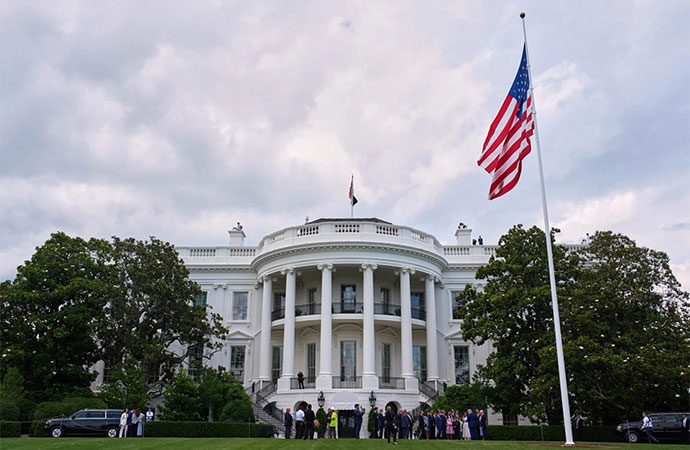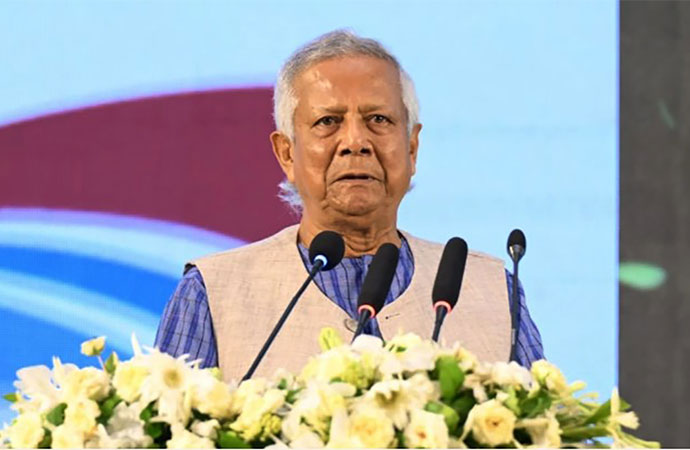Column

White House. Photo: AP/UNB
As with India and Pakistan, whose intense military conflict ended when United President Donald Trump announced a ceasefire between them in May, Israel and Iran agreed to a ceasefire after the American leader made a similar announcement this surprising week in June.
In May, New Delhi and Islamabad offered differing accounts of how the accord had been reached, and each side accused the other of ceasefire violations, but the American-sponsored peace between them has held. Pakistan's Army Chief General Asim Munir, elevated to the post of Field Marshal after the conflict with India, has recommended Trump for the Nobel Peace Prize for his role in having prevented a nuclear war between India and Pakistan.
Perhaps a similar recommendation for the prize will be made by one or the other beneficiary of the ceasefire between nuclear-armed Israel and nuclear-minded Iran, but that remains to be seen.
In the meanwhile, what is on display is the capacity of the United States to bang heads together in Trump's quest to be a peace-making and not a war-making American president. It is astonishing how the US, which itself had attacked Iran's nuclear facilities with bunker-busting bombs and Tomahawk missiles to complete the military journey that Israel had begun, suddenly became the peacemaker between the Jewish and Persian states. Evidently, war changes logic. Iran, which like Pakistan was possibly the weaker side in the conflict, preferred American intervention to Israeli annihilation. Israel, which like India enjoyed the tactical advantage provided by surprise attacks, was held back by the irritating force of disciplining American power. But it is good that the India-Pakistan war did not continue, as also the Israel-Iran war.
The bottom line is this. It would be unwise to discount America's staying power even in a transitional world of emerging great and potentially peer powers. It is instructive to note how China, Russia and the European Union, the three most prominent rising powers, had almost no public role to play in the India-Pakistan and Israel-Iran conflicts. It is America which did. America was derided as a fading power after its admittedly inglorious withdrawal from Afghanistan in 2021 after 20 years of invasion and occupation that represented its longest war It is that America which has secured a comeback with its interventions in South Asia and West Asia. America said and others obeyed. That is what power is about ultimately.
Why does the United States enjoy this power? It is because of what I would call survivalist incumbency.
Survivalist Incumbency
The United States is the incumbent superpower. That is why people talk about China overtaking it; no one talks about the US overtaking anyone else in cumulative power - economic, technological, military and ideational. This incumbency is founded on a capacity to survive change.
The Cold War pitted America's total social mettle against that of the Soviet Union. The US prevailed; the Soviet Union imploded. Unfortunately, the US triump in the Cold War led to a brief but injurious period of hubristic self-congratulation in the form of the celebration of the unipolar moment in global history and the fantastical concept of the End of History purveyed by Francis Fukuyama - the thesis that liberal democracy had emerged as the only viable prospect in domestic and global affairs after the demise of international socialism, its chief rival in the struggle for teleological certainty. Samuel Huntington presciently dismissed the End of History idea and argued instead that the world was in for a renewed Clash of Civilisations - precisely because the ideological framework of conflict between capitalism and communism, which had contained religious and other ethnic conflicts since the end of World War II (in which both the US and the Soviet Union had been victorious), had ended with the American victory in the Cold War. The horrible Balkan wars following the disintegration of Yugoslavia attest to the realism of Hungtington's verdict on global history. Unipolarity was a delusion, as was any promise of global peace based on it.
The US learnt that lesson and acted on it. It accepted China's post-Cold War rise as a strategic reality and began to act on it, first by seeking to bring China into the ambit of capitalist democracies (which did not work) and then by trying to slow down China economically so as to contain it militarily. The latter strategy is work in progress but, like the previous failed strategy to align China ideologically with the United States, it reveals the survivalist streak in American incumbency. Washington understands that its primacy in world affairs is not a gift from above (no matter how much America symbolises itself as being the providental light to other nations) but that primacy is a mandate which must be renewed periodically. Sometimes, the renewal fails to work (famously in Vietnam in 1975, Iran in 1979, Somalia in 1994 and Afghanistan in 2021) but at other times, America makes a considerable difference to global affairs, as in India/Pakistan and Israel/ Iraq, both in 2025.
America has been described as the indispensable power. To the exent that this is true, it is because America has mastered the art of survivalist incumbency. You can love America or you can hate it, but you cannot ignore it.
Of course, other countries, too, are survivors. Civilisational nations such as China, India and Russia have survived thousands of years: America is but a few hundred years old. But those civilisational powers are not the current incumbent. America is.
There is no guarantee that it will remain the survivalist incumbent. At the moment, however, it has no contenders.
The writer is Principal Research Fellow of the Cosmos Foundation. He may be reached at epaaropaar@gmail.com

























Leave a Comment
Recent Posts
Remembering Kalidas Karmakar ( ...
The art world remembers Kalidas Karmakar, a visionary whose creativity ...
An Evening with Shishir Bhatta ...
Cosmos Art Echo, the artist talk initiative of Gallery Cosmos and Cosm ...
Myanmar denies genocide, calls Rohingya crackdown co ..
Yes, of course
Earth’s average temperature last year hovered among ..
Bangladesh and Singapore: A Tale of Two Nations